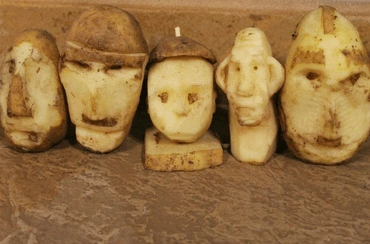1
And the second lot came··out to Simeon, for the tribe of the sons of Simeon, for their families. And their inheritance was in the midst of the inheritance of the sons of Judah.
2
And they◦ had in their inheritance Beer-sheba and sheba◦, and Moladah,
3
and Chazar-shual, and Balah, and Atsem,
4
and Eltolad, and Bethul, and Hormah,
5
and Ziklag, and Beth-marcaboth, and Chazar-susah,
6
and Beth-lebaoth, and Sharuhen; thirteen cities and their villages;
7
Ain, Rimmon, and Ether, and Ashan; four cities and their villages.
8
And all the villages that were all around these cities to◦ Baalath-beer, Ramah of the south. This is the inheritance of the tribe of the sons of Simeon according to their families.
9
From the region of the sons of Judah was the inheritance of the sons of Simeon; for the part of the sons of Judah was too much for them: and the sons of Simeon had· their inheritance in the midst of the inheritance of them◦.
10
And the third lot came··up for the sons of Zebulun according to their families; And the border of their inheritance was to◦ Sarid:
11
and their border went··up toward the sea, and to Maralah, and came··upon Dabbasheth, and came··upon the brook that is before Jokneam;
12
and it turned··back about from Sarid eastward toward the rising◦ of the sun unto the border of Kisloth-tabor; and it went··out to Daberath, and went··up to Japhia;
13
and from there it crossed··over eastward toward the sunrise to Gath-chepher, to Ittah-kazin; and it goes··out to Rimmon-methoar unto Neah.
14
And the border turned··around it from the north to Hannathon, and its outgoings are in the ravine of Jiphthah-el.
15
And Kattath, and Nahalal, Shimron, and Idalah, and Bethlehem; twelve cities and their villages.
16
This is the inheritance of the sons of Zebulun according to their families, these cities and their villages.
17
To Issachar came··out the fourth lot, for the sons of Issachar according to their families.
18
And their border was toward Jezreel, and Chesulloth, and Shunem,
19
and Hapharaim, and Shion, and Anaharath,
20
and Rabbith, and Kishion, and Abez,
21
and Remeth, and En-gannim, and En-haddah, and Beth-pazzez.
22
And the border comes··upon Tabor and to Shahazimah, and Beth-shemesh; and the outgoings of their border were at the Jordan; sixteen cities and their villages.
23
This is the inheritance of the tribe of the sons of Issachar according to their families, the cities and their villages.
24
And the fifth lot came··out for the tribe of the sons of Asher according to their families.
25
And their border was Helkath, and Hali, and Beten, and Achshaph,
26
and Alammelech, and Amad, and Mishal; and it reaches to Carmel toward the sea, and to Shichor-libnath;
27
and it turns··back to the rising◦ of the sun to Beth-dagon, and comes··upon Zebulun, and to the ravine of Jiphthah-el northward to Beth-emek, and Neiel, and goes··out to▵ Cabul on the left.
28
And Ebron, and Rehob, and Hammon, and Kanah, even··to great◦ Zidon;
29
and the border turns··back to◦ Ramah, and to the fortified city Tyre; and the border turns··back to Hosah; and the outgoings thereof were at the sea, from the region to Achzib;
30
and Ummah, and Aphek, and Rehob; twenty and two cities and their villages.
31
This is the inheritance of the tribe of the sons of Asher according to their families, these cities and their villages.
32
To the sons of Naphtali came··out the sixth lot, to the sons of Naphtali according to their families.
33
And their border was from Heleph, from the oak that was in Zaanannim and Adami, Nekeb, and Jabneel, to◦ Lakum; and the outgoings thereof were at Jordan.
34
And the border turned··back toward the sea to Aznoth-tabor; and went··out from thence toward Hukok, and came··upon Zebulun from the south; and it came··upon Asher from the sea, and upon Judah at the Jordan toward the rising◦ of the sun.
35
And the fortified cities were Ziddim, Zer, and Hammath, Rakkath and Chinnereth,
36
and Adamah, and Ramah, and Hazor,
37
and Kedesh, and Edrei, and En-hazor,
38
and Iron, and Migdal-el, Chorem, and Beth-anath, and Beth-shemesh; nineteen cities and their villages.
39
This is the inheritance of the tribe of the sons of Naphtali according to their families, the cities and their villages.
40
For the tribe of the sons of Dan according to their families came the seventh lot.
41
And the border of their inheritance was Zorah and Eshtaol, and Ir-shemesh,
42
and Shaalbin, and Aijalon, and Jethlah,
43
and Elon, and Timnath, and Ekron,
44
and Eltekeh, and Gibbethon, and Baalath,
45
and Jehud, and Bene-berak, and Gath-rimmon,
46
and Me-jarkon, and Rakkon, with▵ the border next··to Joppah.
47
And the border of the sons of Dan went··out beyond them◦; and the sons of Dan went··up and fought with▵ Leshem, and captured it, and smote it with the mouth of the sword, and possessed it, and dwelt therein, and called Leshem, Dan, as the name of Dan their father.
48
This is the inheritance of the tribe of the sons of Dan according to their families, these cities and their villages.
49
And they completed giving· the land ·by··inheritance according to its borders, and the sons of Israel gave an inheritance to Joshua the son of Nun in their midst.
50
According to the mouth of Jehovah they gave him the city he asked, Timnath-serach in Mount Ephraim; and he built the city, and dwelt therein.
51
These are the inheritances which Eleazar the priest, and Joshua the son of Nun, and the heads of the fathers of the tribes of the sons of Israel gave··for··an··inheritance by lot in Shiloh, before Jehovah, at the entrance of the Tabernacle of the congregation◦. And they completed the parting of the land.







